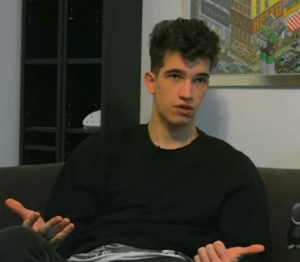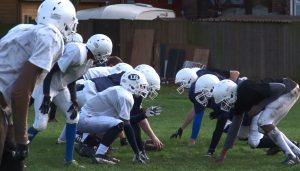Former American football player and coach, and College Football Hall of Famer, Duffy Daugherty, once scoffed at the idea of American football being a ‘contact sport’.
He suggested that dancing is a ‘good example of a contact sport’ – American football, he said, should be considered a ‘collision sport’.
It’s hard to fathom to the ignorant what is appealing about a 250lb Linebacker with genuine resentment in his eyes, bearing down on you, as they prepare to lift you four foot in the air and throw you beneath the Earth’s surface.
To someone who’s never played the game, It’s also hard to imagine a more frightening prospect.
However, aged just 14, east London’s very own American footballer, Csecs Norbert, with only his mother as company, left his native Hungary to begin a new life in England.
Moving countries represents more than the geographical distance we travel. All who read this may remember the isolation we felt when we left our homes and moved onto campus; you may be able to empathise with missing your family and the subtleties we were accustomed to; you may remember walking pensively into unknown territory as your heavy vulnerability suffocates your stifled stride – and none of us moving on to campus were just 14 years of age.
 He describes living in Hungary before his move as “not really an option.” His mother was earning just £2.99 an hour in a country whose prices to live are not too dissimilar to the United Kingdom.
He describes living in Hungary before his move as “not really an option.” His mother was earning just £2.99 an hour in a country whose prices to live are not too dissimilar to the United Kingdom.
He and his mum left alone, his dad stayed behind to help as much as he could from Hungary. He arrived in Kettering in 2014, the town where he would finish high school and complete sixth form.
“Simple things, like headaches every afternoon,” Norbert remembers when discussing the difficulties he faced when he first arrived in Kettering. “From hearing only English, to meeting completely new cultures and people [yes, it was a culture shock].”
“I was very surprised how negative the reactions where when I said anything that implied that I cared about something; but, that just might be because of the low educational standards in the East Midlands.
In post-Brexit Britain, the concept of immigration has become blurred. Home Secretary, Priti Patel, has boasted her ‘point system’ ensures immigration to the UK now becomes a meritocracy, promising the UK will now attract the ‘brightest and best talent from around the world’. Of course, this subsequently implies immigration prior to this point has not been of any benefit to the country.
However, Norbert’s impressive academic career highlights the glaring contradiction of this statement – he graduated school and sixth form and was comfortably accepted into the University of East London (his preferred choice) to study game design. Norbert was a beneficiary of the EU’s Freedom of Movement, and it now seems highly unlikely that a case similar to his own would now be accepted here.
Despite being confident academically, he remembers being disillusioned with his set placements in school and feeling like he had to ‘prove himself’ more than others. Reminiscing, he worries that this “might set people up for a less successful life”:
“I’m not sure if it [my sets] had anything to do with it [me being an immigrant], but it certainly wasn’t based on grades. When I came to the UK, even though I had an A-B equivalent grades in Hungary, they [the school] put me in all of the worst sets for my subjects. I didn’t mind it since it made school easier and I had the self-discipline to study, but in general, I don’t think putting immigrants in the worst sets is good practice.
“People who are new to the UK may have enough on their plate just trying to understand English words, but even when you were used to it, progression between sets was capped at two sets per year. So maybe as an immigrant, you have to prove yourself more, but I still got equal rewards to my peers. I got into the University of East London, my first choice, so I would say it had no negative impact on my life.”
Hungary has a rich history of sport, producing legends such as footballer Ferenc Puskás, and various Olympic gold medallists. Norbert found his solace in sport on his arrival to the UK, even ensuring he could dedicate more of his time to sport than his school timetable required:
“In Hungary, there is state-mandated Physical Education every day. In my secondary school in England, I had to take sports studies just so I could have two outside P.E sessions a week, while most people dodged even the weekly one.
“[Sport] is mostly a cultural thing in Hungary. Almost every young person plays a sport. It’s a culture of fitness. Most of our influence toward sport comes from our parents, especially, for me, since my father was an athlete. Most people I know joined sports teams to play with friends, and then the competitive side’s importance develops in them later on.”
 It may not come as a surprise then, that when Norbert walked into the Sportsdock to join a team on Freshers Week last September, the two sports that appealed to him were ones that require both a mental fortitude and a physicality seldom seen in other sports; a mental fortitude surely required when leaving home so young, and a physicality that his culture encourages.
It may not come as a surprise then, that when Norbert walked into the Sportsdock to join a team on Freshers Week last September, the two sports that appealed to him were ones that require both a mental fortitude and a physicality seldom seen in other sports; a mental fortitude surely required when leaving home so young, and a physicality that his culture encourages.
“I think the first time I saw it I was signing up for another team,” Norbert remembers as he discusses the origins of him playing American football. “I believe I was also looking at rowing, and while signing up for them on the university’s page, I also saw the opportunity to sign up for American football, and straight away, I was like ‘American football?’ ‘Amazing’. So I ran away from rowing and found the American football table to sign up immediately. After that, I went to some taster sessions, and decided to join.”
We come to university to enrich our minds. Yes, we enjoy the bars, the societies, the events. But nobody is paying over £27,000 for the privilege of enjoying a cheap pint of Amstel in the Student Bar. We want to learn. We never stop learning.
So even when we let our hair down, relax and take our mind off our course, our brain refuses to switch off.
“I’d say the most valuable thing I learned (by playing American football) is the understanding that through effort, everything can be achieved, and through bad luck, everything can be lost. What matters is that you pick yourself up after and keep going. [This also applies to my course] as my course also requires close teamwork between many individuals.
During the Covid-19 pandemic, sport around the world was abruptly cancelled. Rightly, there were priorities in the face of the biggest crisis outside of war times since the Spanish Flu; sport wasn’t one of them.
People who declared their desire for sport to return were often vilified and accused of not caring: “there are more important things going on,” social media told us – perhaps, rightly so. But what should also be remembered is the vital role sports plays in people’s lives.
Whether you use it is an instrument of fitness; whether it’s part of your livelihood; whether you find watching your favourite team a vital part of your identity, sport, to many of us, remains a vital function of life.
Norbert admits he finds parts of the lockdown ‘unreasonable’ and misses life as a sportsman:
“It [lockdown] gave me more time, but now sport as a way of stress-relief has dropped from my life and it is tough to find other ways to unwind. The park close to me closed its basketball courts, its tennis courts and running track. I know it’s for the public good, but tennis, for example, is famously a sport where people stay at least four meters away from the nearest person.”
So, sporting students now await next season to scratch their competitive itch, and after a “strange” season this year, Norbert remains focused and undeterred on the challenge ahead, insisting that East London Phoenix will ‘rise from the ashes’ next season.



